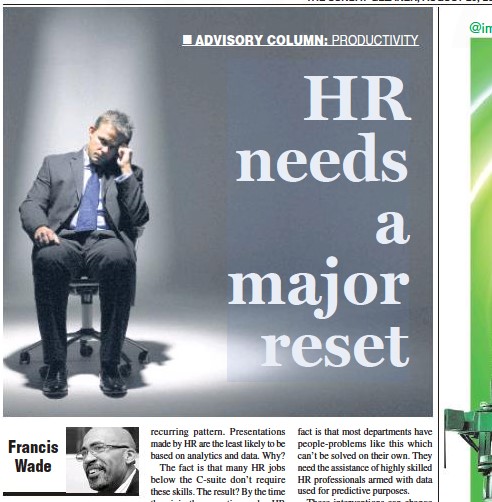A New Contribution| A Fresh Reputation
You are a Caribbean HR Professional who has noticed the respect finance professionals receive in the C-Suite. What they say seems to matter.
As a result, your colleagues in the finance department can see a clear path for themselves to the C-Suite. From accounting analyst, to manager, to director, to CFO, to CEO/MD.
But the same isn’t true for you. In fact, the total number of HR managers to gain a promotion to the CEO level in anything other than a small company is negligible.
By contrast, a recent survey showed that some 52% of UK CEOs have finance backgrounds. But this wasn’t always the case.
Back in the 1980’s accountants were just not that important in companies. They were merely the bookkeepers.
However, they undertook a deliberate effort to upgrade their profession. Using technology and analytics, their value increased as their contribution became essential. New regulatory requirements didn’t hurt.
In other words, they undertook a reset.
What would it take the HR Profession in the Caribbean to do the same?
Fortunately, it already has a business partner. According to research, most CEOs want more from HR Departments. But when surveyed, they only complain “HR is not being strategic enough.”
But what can you do with that vague level of feedback? Here are some specifics gleaned, in part, from my experience hosting the CaribHRForum community and also from leading executive team retreats for two decades.
Evidence-Based Diagnosis
Data is a common element in all great strategic plans. Fortunately, this aligns with most HR Professionals who also would like to use more than anecdotes. The importance of data is something that they now recognise. But, it’s not enough.
I have seen a pattern that repeats itself in over 50 strategic planning retreats. HR presentations are seldom based on analytics and data. Why?
It’s a fact: many HR jobs below the C-Suite don’t need these skills. The result? Before joining the executive ranks, HR professionals have had little practice.
As such, a significant gap may become apparent when they are promoted. Other departments are now competing for the same resources and attention. The counterparts have already been using evidence-based and analytical language to gain approval from top-level executives.
By contrast, CHROs struggle. A vicious cycle can even occur when they request better software but are repeatedly denied. Why? They can’t make the case for a positive ROI…because they lack the data the missing tools would provide.
Unfortunately, CEOs are not likely to identify this problem independently. Like Finance before it, HR must establish a strong business case for a major reset to stop the vicious cycle.
Transformational Innovations
But these analytic capabilities are just the beginning. The Caribbean experiences a significant loss of productivity due to invisible friction. HR has an opportunity here.
For example, workers who struggle to predict their commutes accurately are prone to showing up late. If their on-time presence is required to start work, then the cost of being tardy is high.
The conventional HR approach would be to conduct interviews with employees and encourage them to leave for work earlier. But a department focused on analysis would recommend investing in a minibus exclusively for employees.
HR should keep their focus despite the possibility of objections that the move encourages laziness. Why? The actual inquiry is whether the expense is a worthy investment, based on a clear cost-benefit analysis.
HR needs to take a proactive stance as shown in this example, which is the approach CEOs want. It’s a fact that most departments have people-problems that they can’t solve alone. They require the help of HR professionals with advanced skills and predictive data.
The way the company operates can be changed by these interventions. The crucial point is that they anticipate the needs of the executive team like CFOs are expected to do.
People Predictions
HR can begin planning the organisation’s strategic future once practical measures and data are in place. For example, the Caribbean has a demographic problem looming. Our current population is not being replaced due to insufficient childbirths.
Most HR professionals are unaware of this fact. Does it matter?
Yes – the trend points towards a future with more competition for talent. This has the potential to cause wage inflation. Or a decrease in migration from the region. Or more migrants from other countries. To say it another way, there’s a potential strategic threat forming.
This fact was mentioned during a recent long-term strategic planning session. But not by HR.
However, as an HR Professional, it’s important to track these types of predictions and impacts. In fact, you could function like a CFO, but for everything regarding people.
Your company will find you indispensable if you acquire these skills. However, you will also have the opportunity to experience the gratification that comes with conquering a difficult challenge in your journey towards becoming a highly respected professional. Or even a member of the C-Suite.
This article was based on a Jamaica Gleaner column published on 8/20/2023.

